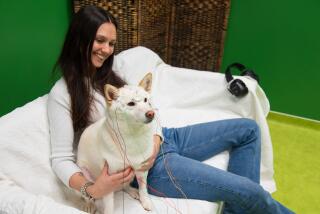Study Stirs Debate on How We Learn Language
- Share via
Babies are so attuned to speech that they can sort sense from nonsense almost instantly--powerful evidence that early experience plays a more crucial role in development than many experts had assumed, researchers said Thursday.
In a series of experiments with 8-month-old babies, scientists at the University of Rochester demonstrated that infants can detect new words in the babble of an unfamiliar language after listening for only two minutes, even though they do not have any idea what the words may mean or any other clues to guide them.
“If this is the case, then the massive amount of experience gathered by infants during the first postnatal year may play a greater role in development than has previously been recognized,” the researchers said.
The new insight fuels a fractious debate between linguists, neuroscientists and child psychologists over the importance of learning versus inborn biology in the development of complex language skills.
“The zillion-dollar question in the study of language development is what is learned and what is innate,” said cognitive science specialist Jenny R. Saffran, who conducted the study with Richard N. Aslin and Elissa L. Newport at Rochester’s infant perception laboratory. “This is the most contentious debate in the field.”
Many language experts hold that the human brain is hard-wired for fundamental aspects of language, with every child inheriting the structure of a universal grammar in the same way that a spider inherits the pattern of the web it weaves.
Recent studies of the brain, however, reveal that its physical structures are far more malleable than previously believed, with the trillions of neural connections rapidly developing or dying off in response to experience. Characteristics of the brain that often may appear “hard-wired” in an adult actually may have been molded during early childhood development in response to external stimulation.
“When you meet a baby,” Saffran said, “You don’t think of it as an enormous learning device.”
Elizabeth Bates, director of the UC San Diego Center for Research in Language, said the new finding is important “primarily because of the mistakes that scientists have made in the past.
“Any parent could tell you that babies learn and that learning is not trivial; it is extremely powerful,” she said. Nevertheless, she added, “There has been a very strong, dominant view in cognitive sciences in general and in language studies in particular that learning of anything really serious is impossible.” So the new finding, she said, “flies in the face of received wisdom.”
MIT linguist Noam Chomsky, perhaps the most influential scholar in formulating the idea that biology shapes language, disagrees. He suggested in an interview that infants’ ability to detect words indeed must be part of the innate structure of the brain because it is engaged so early in development and responds so speedily to new information.
Very young children have a remarkable ability to absorb the language they hear, he said. “That does require very fast, very sharp fine-tuning. Adults can’t do it. Children are somehow very fast,” Chomsky said.
“That suggests it is not learning . . . but a special design in the brain,” he said. “Obviously, the environment affects the nature of the system as it develops.”
UCLA linguist Victoria Fromkin was critical of the study design, calling it “very nice” but saying it did not address the fundamental aspects of language that might be controlled by the biology or the brain. “My own thinking is that this is a generalized learning ability and not just for language,” she said.
The new research, published today in the journal Science, suggests that babies quickly compute where words start and stop by analyzing statistical properties in the noise of the language they hear.
In all, the researchers tested 48 infants on a problem that every child has to solve: the daunting task of figuring out where one word ends and another begins in a continuous stream of a strange sounds.
“The challenge for an infant who has not yet acquired knowledge of the world is that they have to begin the process of figuring out what words are before they can understand any content,” said Aslin, a professor of brain and cognitive sciences at Rochester.
The researchers had the infants listen to two minutes of nonsense syllables mixed with “words” from an artificial language. The scientists devised their own simple language to eliminate the possibility the infants were picking out words based on what they had already learned at home.
To test what the babies learned, the researchers took advantage of every infant’s preference for new sounds and objects. If the babies appeared bored or did not pay attention when the tape was played a second time, the researchers took that to mean the infants had already learned the words.
Linguists agree that babies use a variety of cues to learn language, including pitch, stress, pauses and rhythm. To make sure the infants were not being guided by tone or intonation, the speech was generated in a monotone by a computer synthesizer.
“The patterns that are more consistent and more frequent turn out to be words. We wanted to see if babies used this kind of information to find words,” Saffran said.




